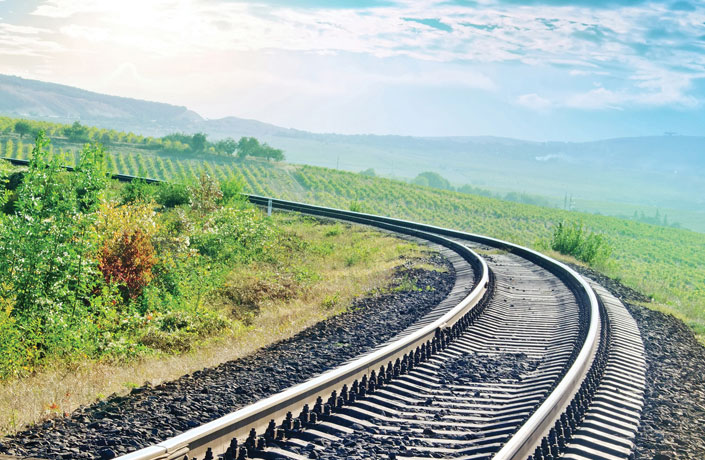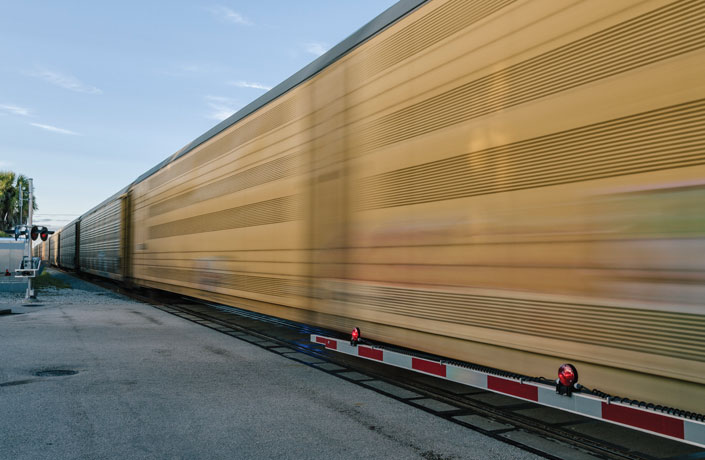-
Railway Age. CSX Actions Add to Shipper Woes
CSX’s unions are the latest in a long line of the railroad’s stakeholders to experience distress from the continued deterioration in the carrier’s service and operations.
By Annn Warner, Spokesperson for FRCA
February 28, 2018 -
Voices for Transparency and Process Reform
ALLIANCE OF AUTOMOBILE MANUFACTURERS
“In a competitive market, an influx of demand would be met by an influx of increased supply (in this case new capacity), but as previously indicated, to many in the shipper community, it seems as though supply is very slow in coming in the rail sector. The Class I railroads tout large investments in capacity, but for many in the shipper community, it is difficult to sort out what is actually new capacity for existing shippers (such as automotive) versus maintenance of existing service or service for new shippers.”
– Shane Karr, Vice President of Federal Government Affairs, Alliance of Automobile Manufacturers. Testimony before the United States Senate Committee on Commerce, Science, and Transportation Freight Rail Service: Improving the Performance of America’s Rail System, September 23, 2014.
-
Voices for Transparency and Process Reform
ARKANSAS ELECTRIC COOPERATIVE CORPORATION
“As 2014 began to unfold AECC started seeing slower average turnaround time (ATT) and lower throughput of coal to its power plants. AECC experienced ATT increases of as much as 30 percent and coal inventories drop by up to 50 percent. At one point an AECC plant had just 16 days of coal inventory.”
– Testimony submitted by the National Rural Electric Cooperatives Association to the United States Senate Committee on Commerce, Science, and Transportation Freight Rail Service: Improving the Performance of America’s Rail System, September 23, 2014.
-
Voices for Transparency and Process Reform
DAKOTA GASIFICATION
“Since 2010, Dakota Gasification has seen drastic increases in transit times to all products. The most extreme example is the tar oil movements to Bayport, Texas. Cycle times have jumped from 30 days last September for a cycle time on those cars to more than 50 days. That’s just in one year or a little less. And so, because of that, we are shipping only 60 percent of our contract to Bayport, Texas. These delays have resulted in more than $17 million in lost revenue since July of 2013. We’ve also contracted, for $3 million, to lease an additional — a hundred additional railcars to allow us to meet those demands.”
– Steve Tomac, Senior Legislative Representative for Basin Electric Power Cooperative testifying on behalf of Basin subsidiary, Dakota Gasification Company. Testimony at Surface Transportation Board Hearing “United States Rail Service Issues, Fargo, SD, September 4, 2014.
-
Voices for Transparency and Process Reform
DUPONT CORP.
“In 1980, when the Staggers Act was passed, there were 26 Class I railroads in the United States. Today there are seven, and four of those carry 90 percent of the traffic in the United States. Two of those are dominant east of the Mississippi River and two of them west of the Mississippi. And so those are the dimensions of the issue here.”
– Mr. F. Edmond Johnston, III, Sustainability Manager, DuPont Corp. Testimony at hearing titled “Perspectives from Users of the Nation’s Freight System’ before the House Transportation & Infrastructure Committee Panel on 21st Century Freight Transportation, October 1, 2013.
-
Voices for Transparency and Process Reform
FORMER STB CHAIR
“The rail industry’s growth makes this an important period for a thorough examination of rail economic regulatory policy. Many of the agency’s longstanding policies were adopted decades ago when the rail industry was struggling to stay alive. Now that the industry is both financially healthier and restructured with far fewer large railroads, I believe the Board should continue the process I started to examine its core policies to ensure that they fit today’s modern rail industry and meet the goals that Congress laid out for the agency. Throughout this inquiry, the Board must fulfill the mandate we received from Congress – balancing the 15 Rail Transportation Policy factors in the Interstate Commerce Act in a manner that serves the public.”
– Mr. Daniel R. Elliott, Former Chair, Surface Transportation Board. Submitted Written Testimony at the Senate Commerce, Science & Transportation Committee Nomination Hearting to Serve on the Surface Transportation Board (Reappointment), May 6, 2015.
-
Voices for Transparency and Process Reform
NATIONAL COAL TRANSPORTATION ASSOCIATION
“I’ve been told by several railroads that they haven’t had a failure because no coal plant has run out of coal. But, to the utility, it is a failure. It is inadequate service if he has to manage the coal pile and, in doing so, either go out on the grid, pay more money at the bus bar from what he would have at his own bus bar — or, I’m sorry, on the grid; or he has to have more expensive natural gas, if he has that capability. But not everyone has that capability. For some people, either it’s coal or nothing. And it also affects grid reliability…”
– Tom Canter, executive director of the National Coal Transportation Association. Testimony at Surface Transportation Board Hearing “United States Rail Service Issues, Fargo, SD, September 4, 2014.
-
Voices for Transparency and Process Reform
NATIONAL GRAIN AND FEED ASSOCIATION
“Surface Transportation Board reauthorization is a good thing. The board, the ability to communicate one another and having a broader base of board is this common sense in today’s day and age. And build to investigate issues without a formal complaint would help shippers. In conclusion, we’re not asking for government regulation, we’re not asking for preferential treatment for grain. We want to make sure that we’re not marginalized, but we need all the stakeholders, the commercials, the railroads, the government, farmers, to extend with the crossroads, identifying action plan to decide how they’re going to measure that plan, assess the measurements and move forward from there.”
– Jerry Cope. Vice President of Marketing, Dakota Mill & Grain, Inc. on behalf of the National Grain and Feed Association. Testimony at Surface Transportation Board Hearing “United States Rail Service Issues, Fargo, SD, September 4, 2014.
-
Voices for Transparency and Process Reform
NATIONAL INDUSTRIAL TRANSPORTATION LEAGUE
“Insuring that the STB has the resources it needs to carry out its statutory mandates is important to our members and rail shippers generally.”
– National Industrial Transportation League President Bruce Carlton, in September 12, 2014 press release endorsing S. 2777, The Surface Transportation Board Reauthorization Act of 2014.
-
Voices for Transparency and Process Reform
NORTH CAROLINA DEPARTMENT OF TRANSPORTATION
“The current state of rail competition in North Carolina fundamentally undermines our ability to compete in the global shipping marketplace and to adequately serve the needs of shippers seeking to transport goods to, from or through North Carolina […] limiting the market opportunities for both imports and exports a foundation of our State’s economy. […] This translates into jobs lost for North Carolinians and into higher costs for our state’s businesses to move goods and serve customers.”
– Jim Trogdon, P.E., Chief Operating Officer, North Carolina Department of Transportation, written testimony to the Surface Transportation Board, June 22¬-23, 2011.
-
Voices for Transparency and Process Reform
OLIN CORPORATION
“SunBelt is a perfect example of how the lack of competition for captive shippers allows railroads to impose onerous rates and terms. Norfolk Southern has increased the tariff rate by 817% over the original contract rate established in 1997. For comparison, the consumer price index has increased only 40% over this same time period.”
– John L. McIntosh, Senior Vice President, Operations, Olin Corporation written testimony to the Surface Transportation Board, June 22¬-23, 2011.
-
Voices for Transparency and Process Reform
SOUTHERN COAL CORPORATION
“For those shippers captive to the railroads, including many coal mines, their market value and ability to earn revenue are completely dependent on the railroad. However, given the monopoly position allowed railroads in many areas of the country, combined with the absence of mechanisms to timely address instances of anticompetitive service shortcomings or price gouging, the railroads have no meaningful incentive to take action to resolve such problems. This state of affairs is undermining the ability of companies like Southern Coal to successfully compete in the marketplace, both domestically and abroad.”
– J Kevin Buster, Southern Coal Corporation, written comments submitted to the Surface Transportation Board, April 12, 2011.
Freight Rail Customer Alliance (FRCA) is an alliance of freight rail shippers impacted by continued unrestrained freight rail market dominance over rail dependent shippers.
Latest News
-
Freight Rail Customer Alliance Submits Comments Supporting Surface Transportation Board’s Competitive Switching Proposal for Inadequate Service
On Oct 7, 2023, the Freight Rail Customer Alliance submitted comments stating its general support of this proposal – notably its aim to retain, expand, and harmonize data reporting by railroads, require carriers to make individualized service data available to their shippers on request, and provide for the possibility of reciprocal switching to enable service […]
-
Senators Tammy Baldwin and Shelley Moore Capito Support the Surface Transportation Board’s Proposed Reciprocal Switching for Inadequate Service and State that More Needs to be Done
On Oct 2, 2023, Senators Tammy Baldwin (D-WI) and Shelley Moore Capito (R-WV), both Members of the Senate Commerce, Science, and Transportation (Commerce) Committee, sent a letter in response to the Surface Transportation Board (STB or Board) proposal put forth in EP Docket 711 (Sub No.-2), Reciprocal Switching for Inadequate Service. Senator Baldwin’s accompany press […]
-
Freight Rail Customer Alliance Welcomes the Surface Transportation Board’s Proposed Service-Based Competitive Switching. Applauds Permanent Railroad-Provided FMLM Data Collection and Historical Individualized Rail Service Data
On September 7, 2023, the Surface Transportation Board (STB) via a 5-0 unanimous Decision proposed a rule that would permanently require rail carriers to submit First-Mile Last-Mile (FMLM) data regarding industry spot and pulls, allow a shipper to receive individualized rail service data for a 90-day period, and provide a reciprocal switching remedy for service […]
-
Freight Rail Customer Alliance Recommends Surface Transportation Board Chair Oberman and Member Fuchs be Nominated for Second Term
On August 1, 2023, the Freight Rail Customer Alliance (FRCA) sent a letter to President Biden recommending that he nominate Surface Transportation Board (STB or Board) Chair Martin Oberman (D) and Member Patrick Fuchs (R), each, to a second term on the Board. Since joining the Board in January 2019, Chair Oberman and Member Fuchs […]
-
House and Senate Appropriations Committees Provide Increased Funding for Surface Transportation Board in FY 2024
On July 20, 2023, the Senate Appropriations Committee approved $47.452 million for the Surface Transportation Board (STB or Board) in its FY 2024 Transportation, Housing and Urban Development (THUD) appropriations measure. Included in this bill is accompanying report language, requested by the Freight Rail Customer Alliance (FRCA), “… continues to encourage the STB to provide […]






